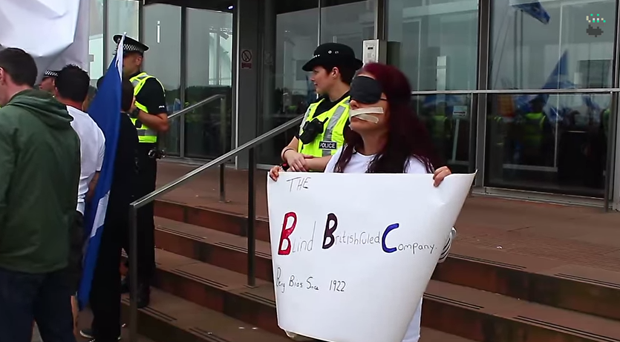2 Oct 2014 | Europe and Central Asia, News, United Kingdom

Supporters of Scottish independence protested against alleged BBC bias ahead of the referendum on 18 September (Image: Mishka Burr/YouTube/Creative Commons)
Benito Mussolini wrote romantic fiction. Of course he did. Maudlin sentimentality is at the very heart of fascism, which is why we should be keeping a closer eye on Mrs Brown’s Boys.
The Cardinal’s Mistress (or to give it its typically grandiose full title: Claudia Particella, Lamante del Cardinale, Grande Romanzo dei Tempi del Cardinale Emanuel Madruzzo) was written in the first decade of the 20th century, when the future dictator was still playing with socialism before he came up with his big idea. It was originally published as a serial in La Vita Trentina, the weekly supplement of socialist newspaper Il Popolo.
Reviewing an English translation of the work in 1928, Dorothy Parker, who admits to er, struggling with the book, dreamed of a scene “in which I tell Mussolini ‘And what’s more, you can’t even write a book that anyone could read. You old Duce you,’” before deadpanning, “You can see for yourself how flat that would leave him.”
It’s unclear whether or not Mussolini was left flat, or even read Parker’s New Yorker magazine review. But it’s possible to imagine that the negative review haunted him to the very end, that Il Duce spent his last days still pondering whether to write an angry letter to the New Yorker, pointing out that since Parker had admitted that she HADN’T EVEN FINISHED THE BOOK, it was a SERIOUS LAPSE of journalistic and critical standards to even run the review, and a sign of how a ONCE GREAT publication had been given over to cheap jibes and sarcasm instead of proper discussion of literary works [and so on, ad lamppostium].
One can imagine his supporters on Twitter, furiously @-ing the poor Parker: “Call yourself a journalist? #NewYorkerBias”, “MSM once again Misreprasents #IlDuce. #NoSurprise (@medialens)”, “So apparently this ‘Parker’ woman is actually a ROTHSCHILD? #BoycottNewYorker”, and so on and on and on and on and wearily on.
You know the kind of thing, because we see it every week now. The dull, thudding obsession with the idea that the media, or a section of the media is involved in some enormous conspiracy against you and your views, and subsequently the belief that that is the only reason not everyone shares your views.
The Scottish independence referendum was a case in point. Yes supporters became curiously obsessed with the BBC’s Nick Robinson and his apparent conservative sympathies. Now, Robinson, like many BBC hacks before him, (Andrew Marr? Socialist Organiser; Paul Mason? Workers’ Power; Jennie Bond? Class War), was politically active in his youth, rising to be president of the equal parts hilarious and horrendous Oxford University Conservative Association. This, plus a terse exchange between Robinson and Scottish Nationalist leader Alex Salmond over a media conference question Robinson felt Salmond had not answered properly, led to hundreds of nationalists converging on BBC Scotland’s headquarters claiming the BBC was biased against them and demanding, well, something.
This was bad enough, but they were egged on by Salmond himself, who said he thought there was “real public concern in terms of some of the nature and balance of the coverage”.
Calls for “balance” are almost always, in fact, calls for more-of-my-side and less-of-the-opposition. This was beautifully demonstrated by the number of complaints logged against the BBC in August about the most recent Israel-Palestine conflict. That month, 938 people complained that the BBC’s coverage was too favourable to the Palestinians, while 813 felt it the corporation was too favourable to the Israeli side. (Incidentally, in the same month over 350 people complained that the BBC had been too pro-independence in its broadcast of a Scottish referendum debate.)
The most embarrassing spectacle of the entire referendum came the days after the vote, when the nationalists had lost. The SNP sulkily decided they would bar right-wing, pro-union newspapers from the morning media conference. Salmond allegedly then tried to handpick which reporter from The Guardian would be allowed attend. The Guardian, doubly affronted by the ban on their press pack colleagues and Salmond’s demands upon it, rightly told Salmond they would skip the conference altogether.
The SNP are far from the only people to think they can demand good coverage and prevent dissent. Mark Ferguson, of the left-wing, trade-union-supported website Labour List, was recently informed that he would not be given a press pass for the Conservative party conference in Birmingham. It was only after other journalists raised their objections via Twitter that the Conservative party relented. It’s probably true to say that the Labour blogger’s coverage would not be the most pro-Tory, but that’s really not the point.
Meanwhile, in the wide world of sport, Newcastle United’s controversial owner owner Mike Ashley has decided that the Daily Telegraph’s Luke Edwards (and anyone else from the Telegraph, for that matter) will not be allowed near the club’s ground again, after Edwards reported rumours that Ashley may be seeking to sell the club.
There is an argument that Ashley generates enough bad publicity for himself without the assistance of apparently hostile journalists (Ashley recently caused confusion after telling a reporter with The i newspaper that club manager Alan Pardew would be “finished” and “dead” if Newcastle lost their next game), but that doesn’t make the move any less thin-skinned and censorious.
Football has form on this. Sir Alex Ferguson may have been the greatest manager of the modern era, but he was also so petty as to refuse to talk to the BBC for seven years after he objected to a documentary about his son aired by the national broadcaster.
Perhaps this tetchiness is what’s needed to get ahead, but it feels increasingly like a retreat from argument, and a retreat from the idea of open debate and a robust public sphere. We won’t accept arguments counter to our own, and if those arguments prove more popular than ours, it is not because ours may need rethinking. No, it is because the world is biased against us. We’re either being silenced by the metropolitan liberals, or censored by the public school Tory elites. Our public conversation is in danger of becoming a public whinge.
Correction 15:40, 2 October: An earlier version of this article stated that Paul Mason was in Workers’ Hammer.
This article was published on Thursday 2 October at indexoncensorship.org
3 Jul 2014 | Digital Freedom, Digital Freedom Statements, European Union, News, Statements

When Europe’s highest court ruled in May that individuals had a ‘right to be forgotten’ many were quick to hail this as a victory for privacy. ‘Private’ individuals would now be able to ask search engines to remove links to information they considered irrelevant or outmoded. In theory, this sounds appealing. Which one of us would not want to massage the way in which we are represented to the outside world? Certainly, anyone who has had malicious smears spread about them in false articles or embarrassing pictures posted of their teenage exploits, or even criminals whose convictions are spent and have the legal right to rehabilitation. In practice, though, the ruling was far too blunt, far too broad brush, and gave far too much power to the search engines to be effective.
At the time of the ECJ decision, Index warned that the woolly wording of the ruling – its failure to include clear checks and balances, or any form of proper oversight – presented a major risk. Private companies like Google – no matter how broad and noble their advisory board might be on this issue – should not be the final arbiters of what should and should not be available for people to find on the internet. It’s like the government devolving power to librarians to decide what books people can read (based on requests from the public) and then locking those books away. There’s no appeal mechanism, no transparency about how Google and others arrive at decisions about what to remove or not, and very little clarity on what classifies as ‘relevant’. Privacy campaigners argue that the ruling offers a public interest protection element (politicians and celebrities should not be able to request the right to be forgotten, for example), but – again – it is hugely over simplistic to argue that simply by excluding serving politicians and current stars from the request process that the public’s interest will be protected.
We are starting to see some of the (high profile) examples of how the ruling is being applied by Google. The Guardian’s James Ball reported on Wednesday that his newspaper had received an email notification from Google saying six Guardian articles had been scrubbed from search results.
“Three of the articles, dating from 2010, relate to a now-retired Scottish Premier League referee, Dougie McDonald, who was found to have lied about his reasons for granting a penalty in a Celtic v Dundee United match, the backlash to which prompted his resignation,” Ball wrote. “The other disappeared articles are a 2011 piece on French office workers making post-it art, a 2002 piece about a solicitor facing a fraud trial standing for a seat on the Law Society’s ruling body and an index of an entire week of pieces by Guardian media commentator Roy Greenslade.”
Similarly, the BBC was told that the link to a 2007 article by the BBC’s Economics Editor, Robert Peston, had also been removed.
Neither The Guardian nor the BBC has any form of appeal against the decision, nor were the organisations told why the decision was made or who requested the removals. You may argue – as some have done – that Google is deliberately selecting these stories (involving well-known journalists with large online followings) as a kind of non-compliant compliance to prove that the ruling is unworkable. Certainly, a fuller picture of the types of request, and much more detailed information about how decisions are arrived at, is essential. You can also point to the fact that it is easy to find the removed articles simply by going to a search engine’s domain outside Europe.
The fact remains that this ruling is deeply problematic, and needs to be challenged on many fronts. We need policymakers to recognise this flabby ruling needs to be tightened up fast with proper checks and balances – clear guidelines on what can and should be removed (not leaving it to Google and others to define their own standards of ‘relevance’), demands for transparency from search engines on who and how they make decisions, and an appeals process. If search engines really believe this is a poor ruling then they should make a clear stand against it by kicking all right to be forgotten requests to data protection authorities to make decisions. The flood of requests that would be driven to these already stretched national organisations might help to focus minds on how to prevent a ruling intended to protect personal privacy from becoming a blanket invitation to censorship.
This article was posted on 3 July 2014 at indexoncensorship.org
14 Feb 2013 | Uncategorized
A Bahraini teenager has been killed by security forces today (14 February) during demonstrations to mark the second anniversary of the Bahrain revolution. Al Jazeeera reported the 16-year-old boy’s name as Ali Ahmed Ibrahim al-Jazeeri. He allegedly died from internationally banned exploding bullets after Bahraini authorities opened fire on the mounting crowds in Al DAih, near the capital Manama. The interior ministry announced a death on its Twitter this morning, but didn’t disclose any further details.

— A child painted with the national colours of Bahrain during the uprisings second anniversary protests, in which a teenager was killed
Evidence given by Jeremy Paxman and a senior BBC official to the BBC internal inquiry into its handling of the Jimmy Savile affair will be removed from public transcripts detailing the investigations evidence. Lawyers examining the soon to be published transcripts said that evidence from the Newsnight presenter and global news director Peter Horrocks was potentially defamatory, and was particularly critical of how BBC management handled the criticism arising from the Savile scandal in Autumn last year. The findings of the inquiry, overseen by former head of Sky News Nick Pollard, were published by the BBC in December. The report examined the corporation’s handling of Newsnight’s dropped investigation into the case in 2011, and its later response after Savile was allegedly outed as a paedophile in October 2012. At the time the transcript was produced, those giving evidence reportedly didn’t know the report was to be made public. Overall, less than 10 per cent of the Pollard review transcripts will be redacted before publication.
A powerful new firewall used to censor online activity could be established in Pakistan within the next month. The Pakistani government has allegedly been working with the same technology companies that helped Iran, China and Libya curb online dissent, to allow authorities to block pornographic or blasphemous online content. Pakistan’s interior minister Rehman Malik confirmed the reports on Twitter, saying The Pakistan Telecommunication Authority (PTA) were in their final negotiations for obtaining the software. The PTA originally tried to introduce a similar $10million measure in 2012, which was quashed after being met with fierce public opposition. Whilst Pakistan claims to use the firewall to protect the country’s internet users from blasphemous and pornographic content, it has already blocked a number of unrelated sites, such as the US-based Buzzfeed.
An NHS whistleblower under investigation for high mortality rates has voiced concerns over patient safety despite a legal gag preventing him from speaking out. Gary Walker warned civil servants that he had been given the same choices that had resulted in the Mid Staffordshire NHS Foundation Trust scandal. He was fired from his job as chief executive of United Lincolnshire Hospitals Trust in 2010 for gross professional misconduct, allegedly because he swore during a meeting. Walker claims he was fired for refusing to meet Whitehall targets for non-emergency patients and then gagged as part of a reported £500,000 settlement emerging from an unfair work dismissal tribunal. He said he was instructed by the East Midlands Strategic Health Authority to meet the 18-week non-emergency target “whatever the demand” and was told to resign when he refused to do so. East Midlands Strategic Health Authority refuted the claims. The Francis report published last week recommended that gagging orders on NHS staff be lifted, orders which Walker said were due to a “culture of fear” within the service. His case has been raised in the commons.
The Israeli government has admitted that “Prisoner X”, the mystery detainee who later committed suicide in solitary confinement, was in fact a spy for Israel. Ben Zygier, as he is now known from reports, was part of Israel’s external intelligence forces known as the Mossad and was arrested in 2010 for charges which still remain unspecified, though they were revealed to be serious. The detention of Australian-Israeli Zygier was reportedly enshrouded in such secrecy that even the prison guards didn’t know his true identity or alleged offence. The information was revealed after a gagging order which forbade the media in Israel from reporting on the case was partially lifted by the Israeli government on 13 February.




